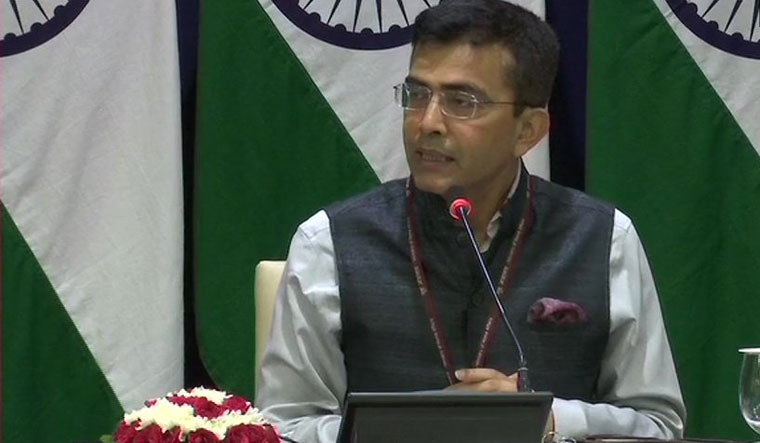Pakistan is nervous that the development and livelihood opportunities that will open up in Jammu and Kashmir and Ladakh after the internal reorganisation will nullify its agenda of supporting separatists and terrorists, alleged India on Friday.
Ministry of external affairs spokesperson Raveesh Kumar said that it was time for Pakistan to accept reality and stop interfering in other countries. Commenting on Pakistan's decision to scale down diplomatic ties—stopping trade, the Samjhauta Express and Thar Express trains, restrictions on airspace and asking Indian high commissioner to Islamabad Ajay Bisaria to return to India—Kumar noted that these decisions were taken unilaterally by Pakistan. "We have urged them to reconsider and expressed regret over the steps they have announced."
Bisaria has not yet reached Delhi. India has asked Pakistan to reconsider its decision.
In fact, Kumar said that diplomatic channels were still open with Pakistan for unimpeded consular access to Kulbhushan Jadhav, as per the directions of the International Court of Justice in The Hague.
The spokesperson pointed out that India has explained its decision and action on Jammu and Kashmir to several countries and international organisations and clearly pointed out that it is an internal matter. He said that India does not agree with Pakistani claims that the situation is assuming alarming proportions. On the contrary, he said that the situation was peaceful in Kashmir, with unimpeded food supply, hospitals working normally and newspapers being published.
Kumar reiterated what Prime Minister Narendra Modi said in his address to the nation on Thursday that the precautionary measures imposed on the Kashmir valley to maintain law and order have only caused temporary inconvenience. Importantly, there has been no incidence of violence.
Commenting on alarmist propaganda that Pakistan was doing through various platforms about what could happen in the future, Kumar said that people can see through such claims. "I would rather go by what my prime minister says about the future, that there will be development and prosperity, which is based on truth, rather than heed such propaganda," he asserted.
"As and when Pakistan decides to internationalise the issue, we shall decide what we have to do," he said.
Although Pakistan has made much noise about India's internal reorganisation of territory in Jammu and Kashmir and Ladakh, the international response has been measured. Even the Islamic nations have either decided not to comment on the internal matter or raised mild concerns and flagged the cautionary note that peace should be maintained.
These are dividends of the intensive effort Modi took in his first term to woo the world and in particular, the Islamic world. As Kumar said, India's engagement with these countries had gone beyond diaspora and religious connections to trade, economy and strategy. The spokesperson also added that the world at large had greatest appreciation of India's position and Pakistani rhetoric had been exposed.



